Existing User Log In
New User Registration
Register for a free account to gain full access to the VGChartz Network and join our thriving community.



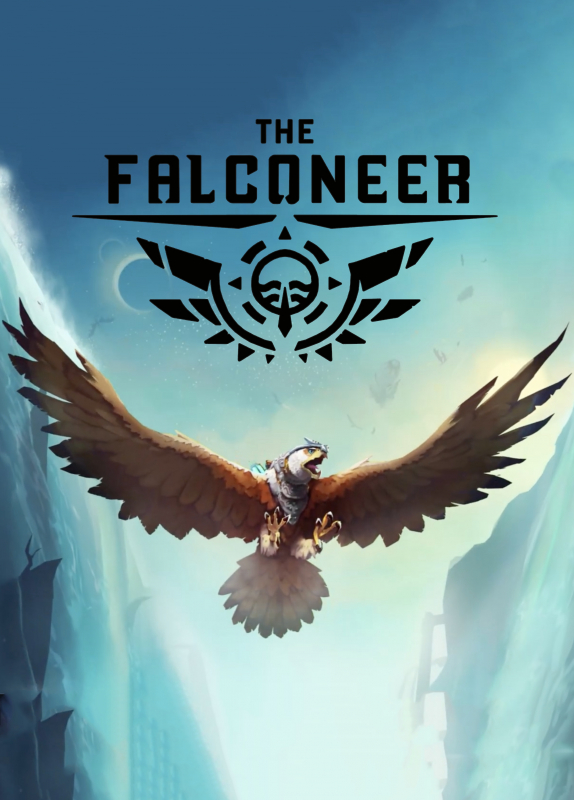

America - Front
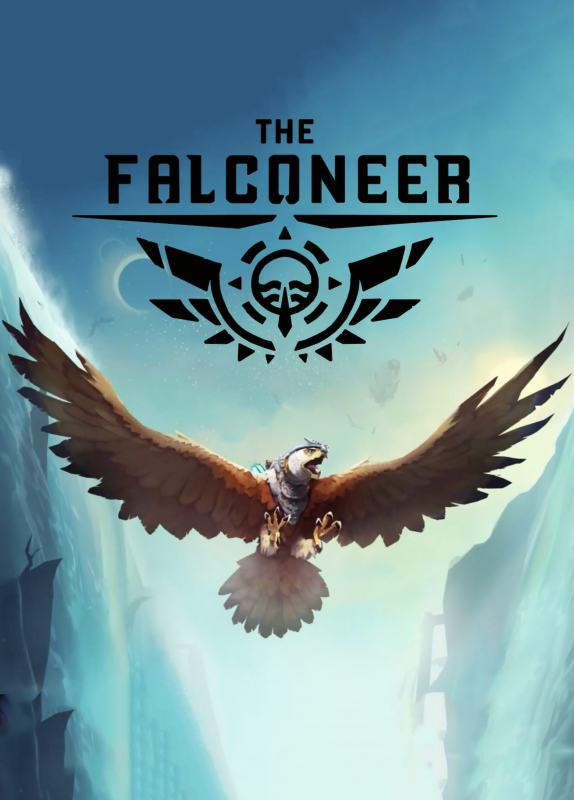

America - Back

Tomas Sala
Action-Adventure
 (Add Date)
(Add Date) (Add Date)
(Add Date) (Add Date)
(Add Date)
| Owners: | 0 |
| Favorite: | 0 |
| Tracked: | 0 |
| Wishlist: | 0 |
| Now Playing: | 0 |
Whether this is more a criticism against the Xbox Series X|S list of new games or a praise of indie developers' potential in the modern era, The Falconeer has perched itself in a unique spot for this next-gen launch. From the Moonpath to Elsweyr mod for Skyrim to a new IP, creator/developer Tomas Sala deserves recognition for this story alone. I, for one, didn't think an ostensibly solo project honoring PC flight combat games could ascend to this level of popularity today. For all that there is about such a fascinating backstory to admire - and more from the game itself - this aerial dogfighter doesn't quite reach the heavens due to uncoordinated design.
While resting on a stone plinth, clinging to life, an enigmatic enchantress discusses events that've befallen The Great Ursee, a fantasy world composed almost entirely of water. As she continues monologuing about time and fate, this thaumaturge reveals how one's history is contained within these strange orbs called 'splinters.' By unlocking these, this unknown patient relives the experiences of someone from each prominent faction.
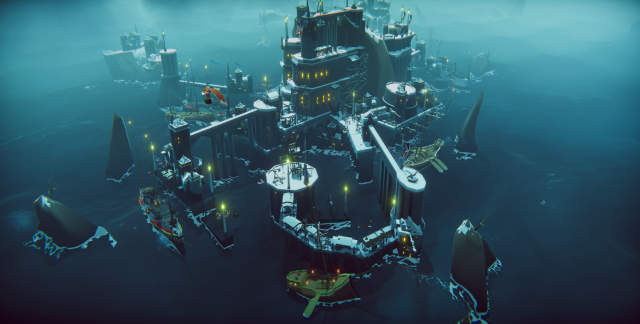
The biggest surprise with Falconeer was actually its story. Sure, the opening salvo of intentionally-vague allusions by the described "seachantress" isn't the best ground on which to place your audience. But once you get into selecting any of the four main chapters (available at the start), the multi-faceted narrative was spoiling the lore-devouring part of my brain. Stepping into the shoes of battered House Dunkle (Chapter 1) gets you invested in both their valiant and morally-questionable actions. The various hostile, friendly, and neutral parties scattered across multiple islands is like a hybrid of Waterworld and A Song of Ice & Fire (Game of Thrones). It's trimmed down compared to Martin's tomes, but there are enough intricacies to appreciate.
What serves as both a benefit and hindrance is the multiple perspective structure. It's neat to have flexibility with appearance and status choices for your falconeer; further, hopping between chapters in non-linear fashion made me appreciate what outcome led to *x* or what news does another faction know about *y* that you personally did during a different faction quest. The issue comes in not connecting with anyone personally. Each playable character, regardless of chapter, is an empty vassal to complete orders, and conversations are radio chatter about the mission a la Star Fox. That isn't to say I expected flashy cutscenes; however, I wonder what could've been done with having free time to discuss your situation with the loremaster or perhaps your wingman too. Just that something extra to breathe more life into the world.
Despite the deflating limitations such projects tend to have, I had to see what happened next on The Great Ursee. The multi-perspective foundation succeeds in providing context to each faction's dilemma; in fact, my hottest take on this would be I came away respecting Falconeer's lens into understanding each warring side more than I did for The Last of Us Part II. Then again, the final act has to resort to the method of making a clear villain - who's unsurprisingly the most British ponce of them all - so the comparison isn't clear-cut. Other annoyances like poor pacing for the sake of more content do harm my appreciation of what's an otherwise rich fantasy world and an interesting story structure.
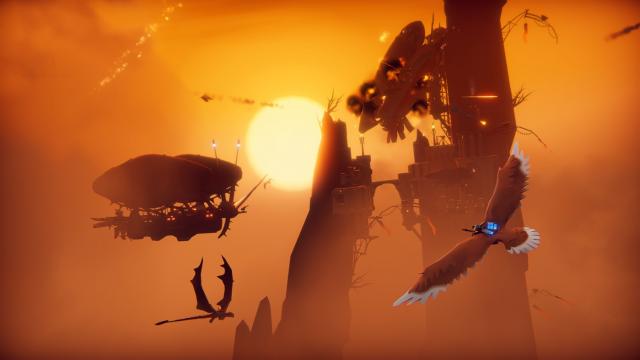
Story is all well and fine, but what about the gameplay? The concept is quite simple: third-person aerial dogfights but you're strapped to a huge falcon instead of a fuel-propelled F15. With the help of ammo that's replenished by lightning storms, your task is to venture into the vast ocean and destroy hostiles in your way. This takes the form of either hunting down specific targets, escorting transports, or carrying packets to a destination. Like that of its heritage, the typical encounter is about outflanking with careful maneuvers to attain the upper hand. As enemy types from air, land, and sea begin to swell and vary, your stratagems must improve to stay ahead.
Reworking my air combat reflexes that've atrophied is easier said than done. There are likely a few who'll talk about the learning curve with this combat; although technically true, this doesn't tell the full story of Falconeer's uncoordinated design. Upon starting Chapter 2, I had to do something I previously haven’t done for any game review: lowered the default difficulty. Yeah, sure, feel free to chime in with 'get good' jabs here, but there's good justification. When considering the offerings between your piddling starting gun, mediocre ammo quality, and paltry rewards in Chapter 1, the dogfights begin to grind you down. Combine this with three different bugged missions, including a raid that felt like a half-hour of combat, that I couldn’t complete and it just broke me.
This despair inspired me to break the game back though. This is where unintended consequences of opening all chapters at once reveals some flaws. The first mission in Chapter 4 is a rudimentary stealth mission with virtually no combat and that netted me more splinters (also in-game currency) than the first five missions in Chapter 1. And since specific items carry over between each of your falconeers, such as chants (permanent buffs) and guns, you can see how gaming the economy from later chapters can pay off. After discovering this, the increasing stakes and missions eventually felt more rewarding.
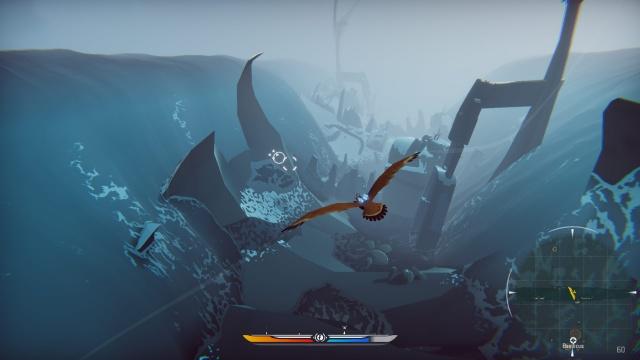
The open world of Great Ursee also plays an instrumental part in both gameplay and story. I wouldn't be shocked to learn some people disliked its expansive, barren openness; personally, I think the context of the world and the built-in fast travel system when on missions alleviated that for me. Aside from the previously stated issue of rigging the game, I think the RPG system works quite well otherwise. The two-pronged consideration of upgrading both weapon and ammo quality is a solid one. There's also incentive in scouring distant locales for potentially hidden side objectives or goodies from exotic sellers - though you'll need to save up money for permits. Although I'm not 100% on-board with some decisions, the world & RPG design satisfy their specialized purposes to this world.
Whether or not these descriptions scared you off, the core gameplay loop comes back to banking left or right and U-turns to make another bombing run. There are issues within that too. The technical things like camera wonkiness whenever collisions occur, lackluster sound design across most weapons, and your falcon's constraining energy meter are tough to ignore. Pound for pound, this isn't the most polished or well-designed dogfighting game out there; veterans more knowledgeable than me will see some disappointing design quirks too. All of this considered, when I got into Falconeer's flow state I had to keep pecking away at the campaign missions.

Beyond just the way it looks in screenshots, Falconeer's visuals sells this world by the creative things seen in motion. Take Ursee's biggest landmark, The Maw, for example: a dividing line between North and South with a water trench of sorts. It's such a fascinating spot that defies all reason. Although most craggy islands and man-made spires play it safe, the compendium of fantastical creatures is unique and varied. I know I'm demanding too much here, but imagine how awesome it'd be to have in-depth customization options for your falcon - from color to ornamentation. Regardless, Tomas Sala has made a vibrant world that I never stopped enjoying despite rare framerate issues and several glitches.
Even with sound design not considered, it's still a mixed bag. Outside of the guttural actor for the loremasters, voice acting clearly wasn't a top priority. Since most side characters are making canned responses like "help me out later!" and whatnot, don't expect a cameo by Sir Patrick Stewart. It seems like hiring consisted of plucking one individual from each distinct part of the UK and calling it a day. One of the only aspects not done by Sala, Benedict Nichols' sonic tapestry fits the world and its distinct factions incredibly well.
For $30 ($40 for a physical copy), the value speaks for itself when you google "how long to beat." Even with swapping between Normal & Easy difficulty, I was closing in on eight hours. With the side content I chose to ignore, you can add on several more. My issue comes back to this question: at what cost? Over time, the 9 or 10 campaign missions per chapter began to feel arbitrary. It's as though 10 was this holy number to constantly strive for, ignoring how repetitive escort missions felt towards the end.
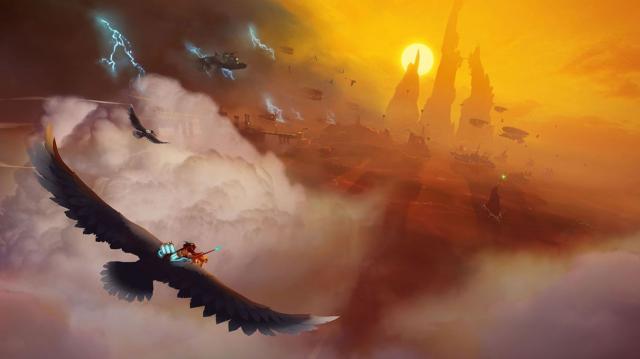
As much as I respect Tomas Sala and the backstory for this game, The Falconeer is burdened with a clipped wing. There's this awesome fantasy at play here: imagine commanding one of those large eagles from Lord of the Rings but with mounted guns! There's a distinct identity with respect to concept and story structure, but some ill-conceived game design and repetitiveness distract too often for its own good. Due to that, I can only endorse genre fans sinking their talons into it.
Despite being one of newest writers on VGChartz, Lee has been a part of the community for over a decade. His gaming history spans several console generations: N64 & NES at home while enjoying some Playstation, SEGA, and PC titles elsewhere. Being an Independent Contractor by trade (electric, plumbing, etc.) affords him more gaming luxuries today though. Reader warning: each click given to his articles only helps to inflate his Texas-sized ego. Proceed with caution.









